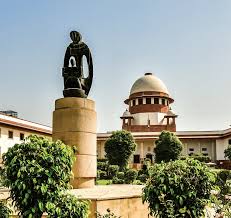Whereby the judgment of conviction under Section 302 of Indian Penal Code, 1860[Hereinafter referred to as ‘IPC’] and order of sentence dated 4th July 2005 passed by the Additional Sessions Judge, Baikunthpur, District Koriya (Chhattisgarh) in Sessions Trial No. 525 of 2004 was upheld. (Para 2)
The convict-appellant had relations with a co-villager, namely, Baiga Gond, as a result of which she conceived a child. She, upon giving birth, allegedly killed this child and threw the corpse into a dabri (small water body- pond). (Para 3.1)
Awarding the punishment of life imprisonment requires due appreciation of evidence and cannot be awarded mechanically and in a perfunctory manner. The law requires that the High Court, must, only after re-appreciation of evidence confirm or overturn the findings of fact returned by the Trial Court. (Para 7)
Thus, none of these witnesses could prove, much less beyond a reasonable doubt, the prosecution case of the accused having thrown the child in the dabri after delivery or having caused the death. (Para 16)
A perusal of the statement of the convict-appellant gives rise to the question as to whether she had admitted her guilt? (Para 18)
Whether, in explaining the purported incriminating circumstance against her, the convict-appellant ought to have disclosed, over and above denial of any relationship with the deceased child, the specifics of her miscarriage and its aftermath; particularly when the prosecution has failed to discharge its burden of establishing such relationship between the deceased and the convict -appellant. (Para 35)
It is a matter of record that none of the witnesses has seen the convict-appellant throwing the deceased child into the dabri; as hitherto observed, no conclusive proof, of any nature, of relationship had been put forth by the prosecution; no evidence has been led to cast doubt upon the version of the convict. The statement of the doctor is silent on the death of the deceased having occurred prior to or after birth, although in examination in chief, the doctor has deposed that the death of the deceased child was homicidal in nature; however, in the cross-examination, it is admitted that such fact does not form part of the record, thereby calling into question the conclusion itself as it is a vital piece of information that has been omitted. (Para 41)
Having considered the gaps mentioned above in the prosecution case, we cannot agree with the learned Courts below that the circumstances conclusively point to the guilt of the convict-appellant, Indrakunwar. (Para 42)
We find the conviction recorded against the convict-appellant to be entirely based on mere presumption, with the actual evidence on record failing to establish the prosecution case much less beyond reasonable doubt. We are constrained to observe that the High Court has confirmed the view of the Trial Court awarding life imprisonment without supplying any cogent reasons therefor. (Para 43)
SUPREME COURT OF INDIA
2023 STPL(Web) 369 SC
[2023 INSC 934]
Indrakunwar Vs. State Of Chhattisgarh
Criminal Appeal No.1730 of 2012-Decided on 19-10-2023
https://stpllaw.in/wp-content/uploads/2023/10/2023-STPLWeb-369-SC.pdf







